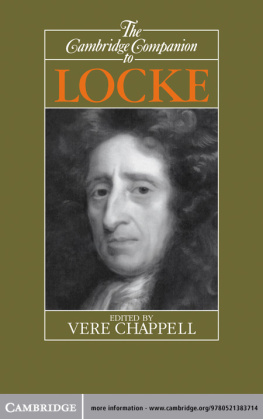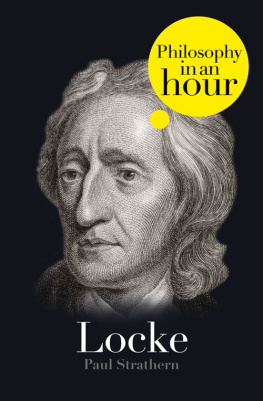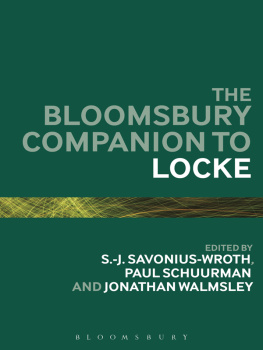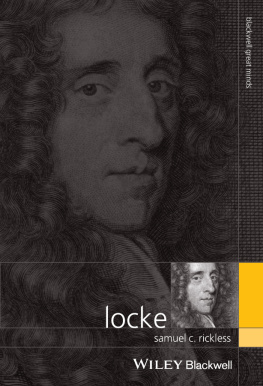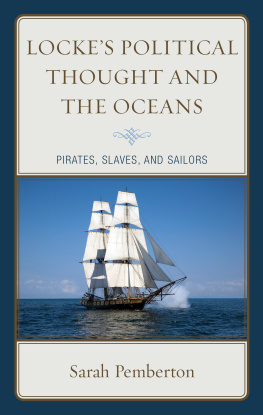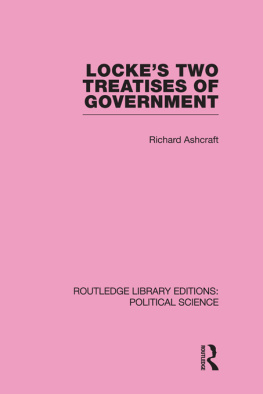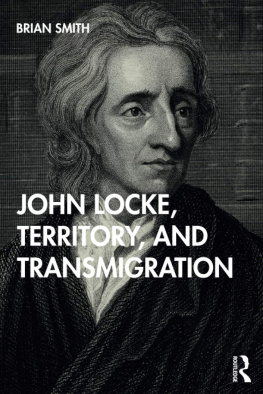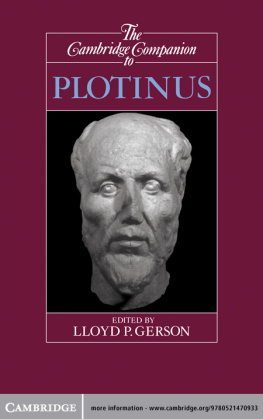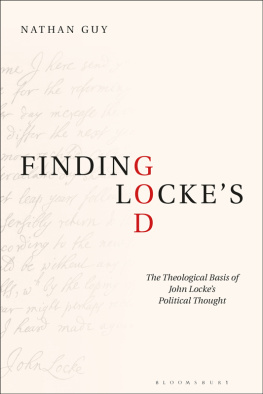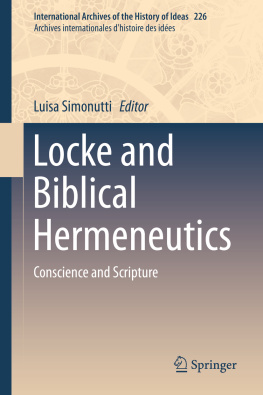Each volume of this series of companions to major philosophers contains specially commissioned essays by an international team of scholars, together with a substantial bibliography, and will serve as a reference work for students and nonspecialists. One aim of the series is to dispel the intimidation such readers often feel when faced with the work of a difficult and challenging thinker.
John Locke, the founder of British empiricism, was also the seventeenth century's staunchest defender of reason in religion and politics. His Essay concerning Human Understanding influenced eighteenth-century thought more profoundly than any book save the Bible; his Two Treatises of Government helped inspire the American and French revolutions; and much of his work is pertinent to current intellectual and social problems. The essays in this volume provide a systematic survey of Locke's philosophy, informed by the most recent scholarship. They cover Locke's theory of ideas, his philosophies of body, mind, language, and religion, his theory of knowledge, his ethics, and his political philosophy. There are also chapters on Locke's life and times and subsequent influence.
New readers and nonspecialists will find this the most convenient and accessible guide to Locke currently available. Advanced students and specialists will find a conspectus of recent developments in the interpretation of Locke's philosophy.
THE CAMBRIDGE COMPANION TO
LOCKE
The Cambridge Companion to
LOCKE
Edited by Vere Chappell

CAMBRIDGE UNIVERSITY PRESS
Cambridge, New York, Melbourne, Madrid, Cape Town, Singapore, Sao Paulo
Cambridge University Press
The Edinburgh Building, Cambridge CB2 2RU, UK
Published in the United States of America by Cambridge University Press, New York
www.cambridge.org
Information on this title: www.cambridge.org/0521383714
Cambridge University Press 1994
This publication is in copyright. Subject to statutory exception and to the provisions of relevant collective licensing agreements, no reproduction of any part may take place without the written permission of Cambridge University Press.
First published 1994
Reprinted 1995 (twice), 1997, 1999
A catalogue record for this publication is available from the British Library
ISBN-10 0-521-38371-4 hardback
ISBN-10 0-521-38772-8 paperback
Transferred to digital printing 2005
CONTRIBUTORS
HANS AARSLEFF is Professor of English at Princeton University. He is the author of The Study of Language in England 17801860 (1967) and of From Locke to Saussure: Essays on the Study of Language and Intellectual History (1982).
RICHARD ASHCRAFT is Professor of Political Science at the University of California, Los Angeles. He is the author of Revolutionary Politics and Locke's Two Treatises of Government (1986) and of Locke's Two Treatises of Government (1987); and has recently edited the four-volume John Locke: Critical Assessments for Routledge.
JONATHAN BENNETT is Professor of Philosophy of Syracuse University, Fellow of the American Academy of the Arts and Sciences, and a Corresponding Fellow of the British Academy. He is the author of, inter alia, Kant's Analytic (1966), Kant's Dialectic (1974), Locke, Berkeley, Hume: Central Themes (1971), and A Study of Spinoza's Ethics (1984). He has also, with Peter Remnant, edited and translated Leibniz's New Essays on Human Understanding (1981).
VERE CHAPPELL is Professor of Philosophy at the University of Massachusetts. He is the coauthor, with Willis Doney, of Twenty-Five Years of Descartes Scholarship (1987), and editor of the 12-volume Essays on Early Modern Philosophers (1992). He also edited the Modern Library Hume, as well as the Hume volume in the Anchor Collections of Critical Essays series.
PAUL GUYER is the Florence R. C. Murray Professor in the Humanities at the University of Pennsylvania. He is the author of Kant and the Claims of Taste (1979), Kant and the Claims of Knowledge (1987), and Kant and the Experience of Freedom (1993), and the editor of The Cambridge Companion to Kant (1992). He is also general coeditor of the Cambridge Edition of the Works of Immanuel Kant, now in progress.
EDWIN McCANN is Associate Professor in the School of Philosophy at the University of Southern California. He has published a number of articles on early modern philosophy, emphasizing Locke.
T. R. MILTON is Lecturer in the Department of Philosophy, King's College, London. He has published several articles, and is currently working on an intellectual biography of Locke.
T. B. SCHNEEWIND is Professor of Philosophy at the Johns Hopkins University. He is the author of Sidgwick's Ethics and Victorian Moral Philosphy (1977), and editor of the two-volume Moral Philosphy from Montaigne to Kant (1990). He also edited the Mill volume in the Anchor Collections of Critical Essays series.
NICHOLAS WOLTERSTORFF is Noah Porter Professor of Philosophical Theology at Yale University, and has been appointed Wilde Lecturer at Oxford University for 1993 and Gifford Lecturer at St. Andrews University for 1995. He is the author of, inter alia, On Universals (1970), Reason within the Bounds of Religion (1976), Art in Action (1980), and Works and Worlds of Art (1980). His latest book, When Tradition Fractures: The Epistemology of John Locke and the Origins of Modern Philosophy, is due to be published shortly.
ROGER WOOLHOUSE is Reader in Philosophy at the University of York. He is the author of Locke's Philosophy of Science and Knowledge (1971) and Locke (1983), and coauthor, with Roland Hall, of 80 Years of Locke Scholarship: A Bibliographical Guide (1983). He is also editing the Leibniz volumes in the Routledge Critical Assessments series.
NOTE ON CITATIONS
References to Locke's works are made parenthetically, using an abbreviated title of the work or its source.
The editions of or sources for Locke's works that are cited, with abbreviations given in brackets, are the following:
| [B] | Manuscripts in the Bodleian Library. |
| [C] | The Correspondence of John Locke, ed. E. S. de Beer. 9 vols. (1976). |
| [D] | Drafts for the Essay concerning Human Understanding, and Other Philosophical Writings, ed. Peter H. Nidditch and G. A. J. Rogers. 3 vols. (1990). |
| [E] | An Essay concerning Human Understanding, ed. Peter H. Nidditch (1975). |
| [EL] | Essays on the Law of Nature, ed. W. von Leyden (1954). |
| [L] | The Life of John Locke, by Peter, Lord King, new ed. 2 vols. (1830). |
| [QL] | Questions concerning the Law of Nature, ed. and tr. Robert Horwitz, Jenny Strauss Clay, and Diskin Clay (1990). |
| [T] | Two Treatises of Government, ed. Peter Laslett, 2nd ed. (1967). |
| [TE] | Some Thoughts concerning Education, ed. John W. Yolton and Jean S. Yolton (1989). |
| [W] | The Works of John Locke, new ed., corrected. 10 vols. (1823; repr. 1964). |
In the case of major works and collections, the abbreviated title is followed by an array of numerals designating internal divisions volumes, books, parts, chapters, sections, and so forth and then a page number, preceded by a colon. Thus a reference to Book II, Chapter xxi, Section 47, page 263 of the

